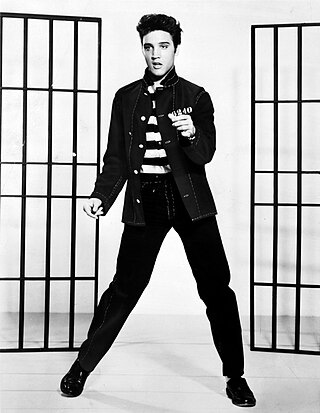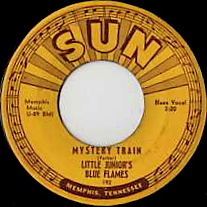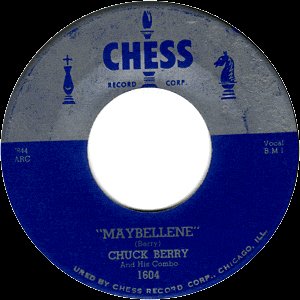Related Research Articles

Elvis Aaron Presley, known mononymously as Elvis, was an American singer and actor. Known as the "King of Rock and Roll", he is regarded as one of the most significant cultural figures of the 20th century. Presley's energized performances and interpretations of songs, and sexually provocative dance moves, combined with a singularly potent mix of influences across color lines during a transformative era in race relations, brought both great success and initial controversy.
Rock and roll is a genre of popular music that evolved in the United States during the late 1940s and early 1950s. It originated from African American music such as jazz, rhythm and blues, boogie-woogie, electric blues, gospel, and jump blues, as well as country music. While rock and roll's formative elements can be heard in blues records from the 1920s and in country records of the 1930s, the genre did not acquire its name until 1954.

The Rock and Roll Hall of Fame (RRHOF), also simply referred to as the Rock Hall, is a museum and hall of fame located in downtown Cleveland, Ohio, United States, on the shore of Lake Erie. The museum documents the history of rock music and the artists, producers, engineers, and other notable figures and personnel who have influenced its development.

The Stooges, originally billed as the Psychedelic Stooges, and also known as Iggy and the Stooges, were an American rock band formed in Ann Arbor, Michigan, in 1967 by singer Iggy Pop, guitarist Ron Asheton, drummer Scott Asheton, and bassist Dave Alexander. Initially playing a raw, primitive style of rock and roll, the band sold few records in their original incarnation and gained a reputation for their confrontational performances, which often involved acts of self-mutilation by Iggy Pop.

Antoine Caliste Domino Jr., known as Fats Domino, was an American singer-songwriter and pianist. One of the pioneers of rock and roll music, Domino sold more than 65 million records. Born in New Orleans to a French Creole family, Domino signed to Imperial Records in 1949. His first single "The Fat Man" is cited by some historians as the first rock and roll single and the first to sell more than 1 million copies. Domino continued to work with the song's co-writer Dave Bartholomew, contributing his distinctive rolling piano style to Lloyd Price's "Lawdy Miss Clawdy" (1952) and scoring a string of mainstream hits beginning with "Ain't That a Shame" (1955). Between 1955 and 1960, he had eleven Top 10 US pop hits. By 1955, five of his records had sold more than a million copies, being certified gold.

James Newell Osterberg Jr., known professionally as Iggy Pop, is an American singer, musician, songwriter, actor and radio broadcaster. He was the vocalist and lyricist of proto-punk band the Stooges, who were formed in 1967 and have disbanded and reunited many times since. Often called the "Godfather of Punk", he was named one of the 50 Great Voices by NPR. In 2010, he was inducted into the Rock and Roll Hall of Fame as a member of the Stooges. Pop also received a Grammy Lifetime Achievement Award in 2020 for his solo work.

Winfield Scott Moore III was an American guitarist who formed The Blue Moon Boys in 1954, Elvis Presley's backing band. He was studio and touring guitarist for Presley between 1954 and 1968.

Raw Power is the third studio album by American rock band the Stooges, released on February 7, 1973 by Columbia Records. The album departed from the "groove-ridden, feel-based songs" of the band's first two records in favor of a more anthemic hard rock approach inspired by new guitarist James Williamson, who co-wrote the album's eight songs with singer Iggy Pop. Pop produced the recording sessions himself and David Bowie assisted with post-production work, though the team were allotted only one day to mix the album and the resulting fidelity was poor. Later reissues have attempted to either correct or enhance the original mix, most notably Pop's 1997 remix, which became notorious for its extreme volume and compression.

Harold "Chuck" Willis was an American blues, rhythm and blues, and rock and roll singer and songwriter. His biggest hits, "C. C. Rider" (1957) and "What Am I Living For" (1958), both reached No.1 on the Billboard R&B chart. He was known as The King of the Stroll for his performance of the 1950s dance the stroll.

Many musical styles flourished and combined in the 1940s and 1950s, most likely because of the influence the radio had in creating a mass market for music. World War II caused great social upheaval, and the music of this period shows the effects of that upheaval.
The origins of rock and roll are complex. Rock and roll emerged as a defined musical style in the United States in the early to mid-1950s. It derived most directly from the rhythm and blues music of the 1940s, which itself developed from earlier blues, the beat-heavy jump blues, boogie woogie, up-tempo jazz, and swing music. It was also influenced by gospel, country and western, and traditional folk music. Rock and roll in turn provided the main basis for the music that, since the mid-1960s, has been generally known simply as rock music.

"Mystery Train" is a song written and recorded by American blues musician Junior Parker in 1953. Originally performed in the style of a Memphis blues or rhythm and blues tune, it was inspired by earlier songs and later became a popular rockabilly song, as first covered by Elvis Presley, then numerous others.

Jonathan Denis Langford is a Welsh musician and artist based in Chicago, Illinois, United States.

"Maybellene" is a rock and roll song by American artist Chuck Berry, adapted in part from the western swing fiddle tune "Ida Red". Released in 1955, Berry’s song tells the story of a hot rod race and a broken romance, the lyrics describing a man driving a V8 Ford and chasing his unfaithful girlfriend in her Cadillac Coupe DeVille. It was released in July 1955 as a single by Chess Records, of Chicago, Illinois. Berry's first hit, "Maybellene" is considered a pioneering rock and roll song. Rolling Stone magazine wrote of it, "Rock & roll guitar starts here." The record was an early instance of the complete rock and roll package: youthful subject matter; a small, guitar-driven combo; clear diction; and an atmosphere of unrelenting excitement.

Dave Marsh is an American music critic and radio talk show host. He was an early editor of Creem magazine, has written for various publications such as Newsday, The Village Voice, and Rolling Stone, and has published numerous books about music and musicians, mostly focused on rock music. He is also a committee member of the Rock and Roll Hall of Fame.

Since the beginning of his career, American singer Elvis Presley has had an extensive cultural impact. According to the monthly magazine, Rolling Stone, "It was Elvis who made rock 'n' roll the international language of pop." The Rolling Stone Encyclopedia of Rock & Roll describes Presley as "an American music giant of the 20th century who single-handedly changed the course of music and culture in the mid-1950s". His recordings, dance moves, attitude, and clothing came to be seen as embodiments of rock and roll. His music was heavily influenced by African-American blues, Christian gospel, and Southern country. In a list of the greatest English language singers, as compiled by Q magazine, Presley was ranked first, and second in the list of greatest singers of the 20th century by BBC Radio. Some people claim that Presley created a whole new style of music: "It wasn't black, wasn't white, wasn't pop or wasn't country—it was different." As most singers in his time created music geared for adults, he gave teens music to grow up with.

T. Rex were an English rock band formed in London in 1967 by singer-songwriter and guitarist Marc Bolan, who was their leader, frontman and only consistent member. Though initially associated with the psychedelic folk genre, Bolan began to change the band's style towards electric rock in 1969, and shortened their name to T. Rex the following year. This development culminated in 1970 with their first significant hit single "Ride a White Swan", and the group soon became pioneers of the glam rock movement.
This article includes an overview of the major events and trends in popular music in the 1950s.

"I Knew the Bride (When She Used to Rock 'n' Roll)" is a song written by Nick Lowe and first popularised by Dave Edmunds. It was released on Edmunds's 1977 album Get It and a year later in a live version by Nick Lowe's Last Chicken in the Shop on Live Stiffs Live.

"A Rock 'n' Roll Fantasy" is the lead single and fourth track from The Kinks' 1978 album Misfits. Written by Ray Davies, the song was inspired by the band's then-tumultuous state at the time, with two members leaving the band during the recording of Misfits. Released as the first single from the album, the track was the band's most successful single in years, reaching number 30.
References
- ↑ "Chuck Death". lambiek.net. Retrieved May 26, 2021.
- ↑ "Chuck Death". lambiek.net. Retrieved May 26, 2021.
- ↑ Words and Music: Our 60 Favorite Music Books